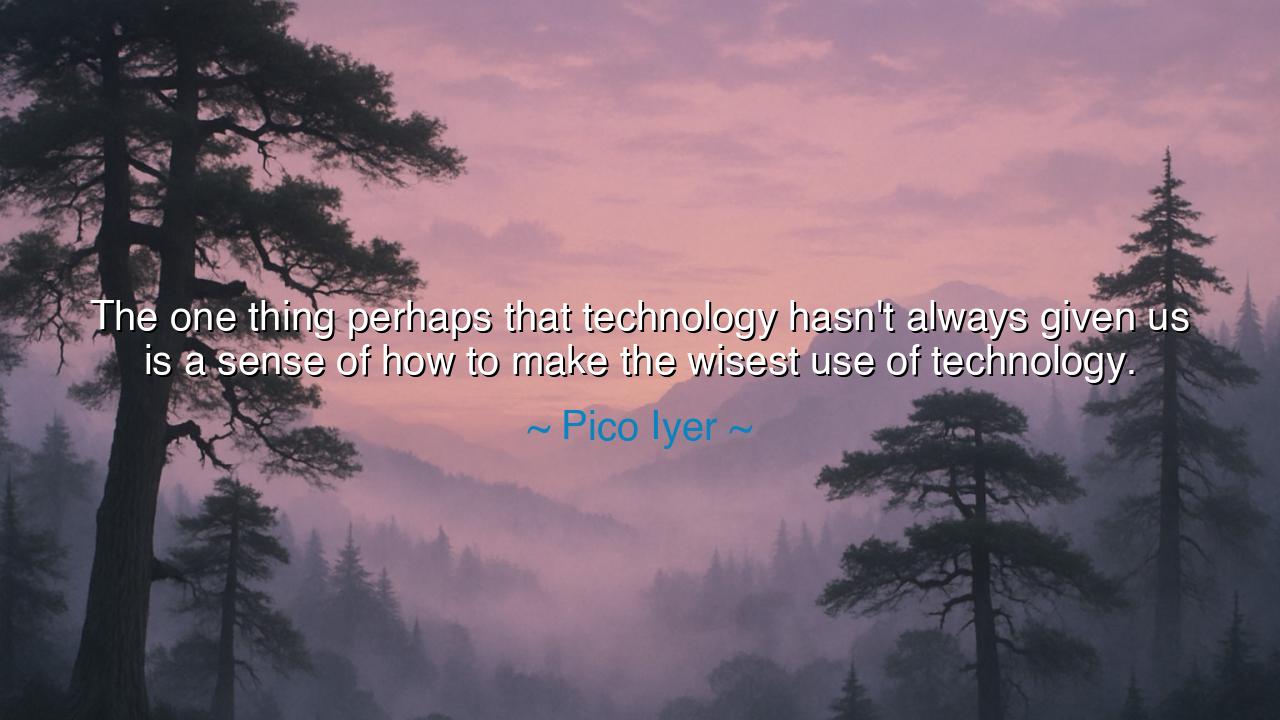
The one thing perhaps that technology hasn't always given us is
The one thing perhaps that technology hasn't always given us is a sense of how to make the wisest use of technology.






The words of Pico Iyer, wanderer of the world and pilgrim of the soul, carry the weight of reflection: “The one thing perhaps that technology hasn't always given us is a sense of how to make the wisest use of technology.” In this simple yet profound declaration lies a paradox of our age. For though technology has brought us power beyond the dreams of kings and sages, it has not granted us the wisdom to wield that power rightly. We hold in our hands tools that can build or destroy, connect or divide, enlighten or ensnare — but the choice of how to use them lies not in the devices themselves, but in the hearts of their users.
The meaning is eternal: invention alone is not wisdom. The ancients knew this truth. The blacksmith could forge both a plow and a sword; fire could cook the meal or burn the village. Technology has always been neutral, a mirror reflecting the virtues or vices of those who employ it. But in our era, where the pace of innovation outstrips the growth of reflection, the danger is sharper. We rush to adopt, to upgrade, to consume, yet seldom pause to ask: Does this serve life, or does it diminish it?
The origin of Iyer’s insight springs from his life of observation. As a traveler, he has witnessed the marvel of connection that technology provides: voices carried across oceans, cultures meeting in seconds, the world made small. Yet he has also seen how this same force scatters attention, breeds distraction, and blinds us to the very life unfolding before our eyes. His words remind us that having tools does not equal knowing their purpose; wisdom lies in discerning when to use, and when to refrain.
History offers us many examples. Consider the tale of the atomic bomb. Science, through brilliance and perseverance, split the atom and unlocked a force greater than the sun. Yet the wisdom to use it was lacking, and so it fell upon Hiroshima and Nagasaki, bringing destruction unlike any the world had seen. The lesson was clear: human beings had achieved the pinnacle of technological mastery, but their moral compass had not kept pace. The result was not triumph, but tragedy.
On the other hand, there are stories of wise use. When Gutenberg’s printing press spread across Europe, it gave birth to both confusion and enlightenment. Yet when used with purpose, it fueled the Renaissance and the Reformation, awakening minds and expanding horizons. Here, we see that the true blessing of technology is only revealed when coupled with responsibility, patience, and vision. Tools alone do not create progress; it is the wisdom of their application that does.
The lesson for us is urgent. We must not be intoxicated by the speed of innovation. Technology will not teach us how to use itself; it will only tempt us with endless possibilities. It is we, the stewards of its power, who must cultivate reflection. We must ask ourselves: Does this tool bring me closer to others, or isolate me? Does it deepen my humanity, or scatter it? Does it serve life, or does life serve it? Only in such questions can we discover the path of wise use.
Practical action lies before us. Set aside times of silence, where no device intrudes, so that the heart may recover its balance. Use technology deliberately, not compulsively. Let it serve your deepest values — connection, knowledge, compassion — rather than hollow impulses of distraction. Share tools with others to uplift, not to deceive. And most of all, remember that wisdom cannot be downloaded; it must be cultivated in stillness, humility, and thought.
Thus, let Pico Iyer’s words be etched into the scroll of our times: technology has given us power, but not wisdom. That wisdom is our task to forge, as fire is forged into steel. Let each generation learn not only to create new tools, but to ask how best to wield them. For only then will our inventions become instruments of harmony rather than chaos, and our age be remembered not for its clutter of machines, but for its clarity of purpose.






AAdministratorAdministrator
Welcome, honored guests. Please leave a comment, we will respond soon